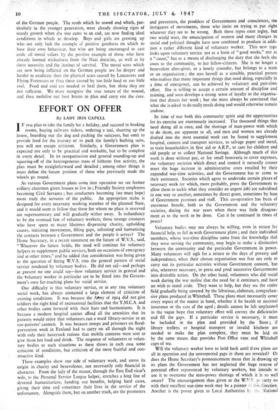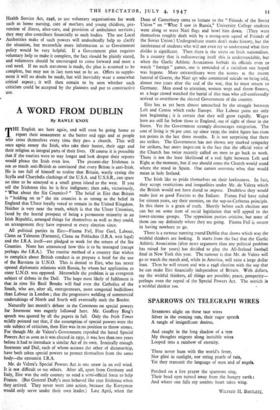EFFORT ON OFFER
By LADY IRIS CAPELL
F you plan to take the family for a holiday, and succeed in booking rooms, buying railways tickets, ordering a taxi, shutting up the house, boarding out the dog and packing the suitcases, but omit to provide food for the journey or to pack the family's bathing suits, you will not escape criticism. Similarly, a Government plan is expected not only to be practical and workable, but to•be complete in every detail. In its reorganisation and general rounding-up and squaring-off of the heterogeneous mass of hitherto free activity, the plan must be straightforward and detailed ; among other things it must define the .future position of those who previously made the wheels go round.
As various Government plans come into operation we see former colliery chairmen given houses to live in ; Friendly. Society employees becoming Civil Servants ; bus conductors becoming (we must hope) more truly the servants of the public. An appropriate niche is designed for every necessary working member of the planned State, and it would seem to follow that those for whom no place is reserved are supernumerary and will gradually wither away. Is redundancy to be the eventual fate of voluntary workers, those strange creatures who have spent so many lifetimes dispensing charity, upholding causes, initiating movements, filling gaps, softening and humanising the contacts between a Government and the people it serves? The Home Secretary, in a recent statement on the future of W.V.S., said, " Whatever the future holds, the need will continue for voluntary helpers to supplement public services, both on occasions of emergency and at other times," and he added that consideration was being given to the question of fitting W.V.S. into the general pattern of social service rendered by voluntary bodies. He did not say—and perhaps at present no one could say—how voluntary service in general and the voluntary worker in particular are to be fitted into the Govern- ment's own far-reaching plans for social service.
One difficulty is that voluntary service, or at any rate voluntary social work, has always contained a large element of criticism of existing conditions. It was because the Army of 1914 did not give -soldiers the right kind of recreational facilities that the Y.M.C.A. and other bodies came forward with their huts and harmoniums. It is because a modern hospital cannot afford all the amenities that its patients would enjoy that volunteers run a ward library-service or an out-patients' canteen. It was because troops and prisoners on flood- prevention work in Fenland had to carry on all through the night with only their haversack rations that mobile canteens were sent to give them hot food and drink. The response of volunteers or volun- tary bodies to such situations as these shows in each case some criticism of conditions, but criticism of the most fruitful and con- structive kind.
These examples show one side of voluntary work, and stress its origin in charity and benevolence, not necessarily only financial in character. From the lady of the manor, through the East End vicar's wife, to the Personal Service League helper, stretches a long line of devoted humanitarians, handing out benefits, helping hard cases, giving their time and sometimes their lives in the service of the unfortunate. Alongside them, but on another track, are the promoters and preventers, the prodders of Governments and consciences, the instigators of movements, those who insist on trying to put right whatever they see to be wrong. Both these types exist to lay, but two world wars, the emancipation of women and many changes in social and political thought have now combined to produce in addi- tion a rather different kind of voluntary worker. This new type looks upon voluntary service not as a form of " good works," nor as a " cause," but as a means of discharging the duty that she feels she owes to the community, to her fellow-citizens. She is no longer a benevolent alms-giver, or a lonely crusader, but belongs to a team or an organisation ; she sees herself as a sensible, practical person who realises that many important things that need doing, especially in a time of emergency, can be achieved by voluntary and part-time effort. She is willing to accept a certain amount of discipline and training, and soon develops a strong sense of loyalty to the organisa- tion that directs her work ; but she must always be convinced that what she is asked to do really needs doing and would otherwise remain undone.
In time of war both this community spirit and the opportunities for its exercise are enormously increased. The thousand things that need doing all at once, and the shortage of man-power with which to do them, are apparent to all, and men and women not already drafted into the most essential work can be. found to supplement hospital, canteen and transport services, to salvage paper and metal, to train householders ,in first aid or A.R.P., to care for children and old people or to collect National Savings. Although much of this work is done without pay, or for small honoraria to cover expenses, the voluntary societies which direct and control it naturally cannot meet the huge increase in administrative costs entailed by their expanded war-time activities, and the Government has to come to their assistance. Societies which agree to undertake certain pieces of necessary work (or which, more probably, press the Government to allow them to tackle what they consider an urgent job) are subsidised in one way or another, sometimes by direct grant, sometimes by loan of Government premises and staff. This co-operation has been of enormous benefit, both to the Government and the voluntary societies, during the war years when there was little disagree- ment as to the work to be done. Can it be continued in times of peace?
Voluntary bodies may not always be willing, even in return for financial help, to fall in with Government plans ; and their individual members, whose war-time discipline came from the knowledge that they were serving the community, may begin to make a distinction between the community and the particular Government in power. Many volunteers will sigh for a return to the days of poverty and independence, when their chosen organisation was free not only to carry out its particular activities without Government consent, but also, whenever necessary, to press and prod successive Governments into desirable action. On the other hand, volunteers who did social work during the war realise that the need for it continues, and have no wish to stand aside. They want to help, but they see the entire field gradually being covered by the laborious, elaborate, comprehen- sive plans produced in Whitehall. These plans must necessarily cover every aspect of the matter in hand, whether it be health or national insurance or the care of the aged ; details cannot be left unplanned in the vague hope that voluntary effort will correct the deficiencies and fill the gaps. If a particular service is necessary, it must be included in the plan and provided by the State ; if library trolleys or hospital transport or invalid kitchens are needed to make the plan complete, they must be laid on by the same means that provides Post Office vans-and Whitehall cups of tea.
Will the voluntary worker have to hold back until these plans are all in operation and the unsuspected gaps in them are revealed? Or does the Home Secretary's• pronouncement mean that in drawing up its plans the Government has not neglected the huge reserve of potential effort represented by voluntary workers, but intends to use it to overcome the man-power shortage of which it is so well aware? The encouragement thus given to the W.V.S. to carry on with their excellent war-time work may be a pointer in this direction. Another is the power given to Local Authorities ht the National
Health Service Act, 1946, to use voluntary organisations for work such as home nursing, care of mothers and young children, pre- vention of illness, after-care, and provision of ambulance services ; they may also contribute financially to such bodies. The use Local Authorities make of such powers will undoubtedly help to. clarify the situation, but meanwhile more information as to Government policy would be very helpfdl. If a Government plan requires voluntary help to make it complete, the fact should be plainly stated, and volunteers should be encouraged to come forward and meet a real need. If no such statement is made, the plan is assumed to be complete, but may not in fact turn but to be so. Offers to supple- ment it will no doubt be made, but will inevitably wear a somewhat critical aspect ; it will then remain to be seen whether such criticism could be accepted by the planners and put to constructive use.







































 Previous page
Previous page